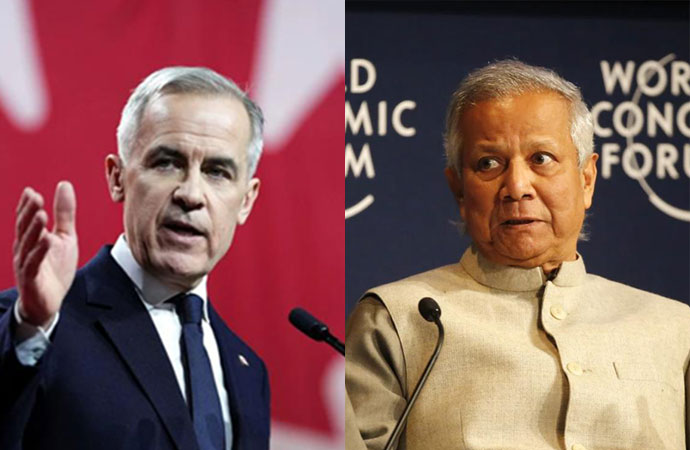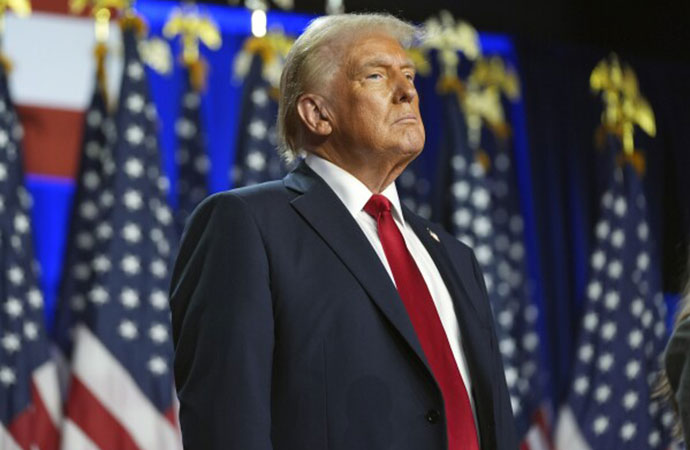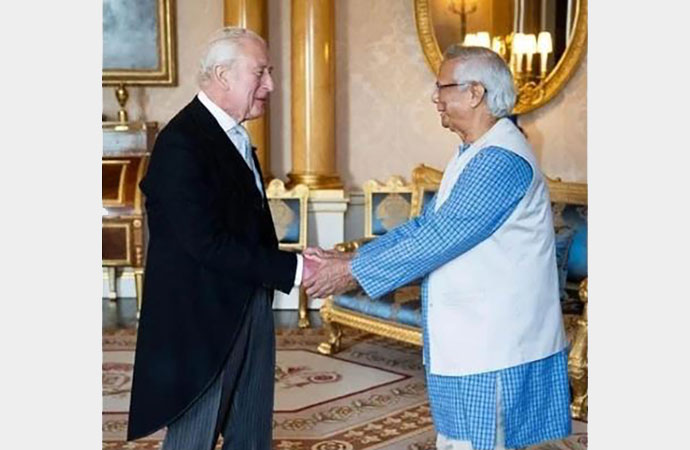Column

Mark Carney and Muhammad Yunus. Photo: AP/UNB
In two far-flung corners of the Commonwealth, two economists have taken charge of their countries to assert sovereignty in the face of hegemonically powerful neighbors. In Canada, the seasoned central banker Mark Carney has become Prime Minister with a vow to uphold Canadian sovereignty. Carney was previously the governor of both the Bank of England and the Bank of Canada. In Bangladesh, the economist and Nobel laureate Muhammad Yunus was roped in to head an interim government which is re-asserting Bangladeshi sovereignty.
Mark Carney led the Liberal Party to win the general election with a vow to stand up to bullying by Canada's southern neighbor. President Donald Trump earlier called for Canada to join the United States and become the 51st state of the American federation. Carney told Trump that Canada is "not for sale" during an Oval Office meeting with the real estate mogul turned politician. Soon after his election, Carney declared "we must recognize that the reality of the world has fundamentally changed".
Trump's threats forced many Canadians to boycott American products. Carney's government has announced a raft of measures to reduce Canadian dependency on the U.S. economy, particularly in the defense sector. "Seventy-five cents of every (Canadian) dollar of capital spending for defense goes to the United States. That's not smart", Carney told Canadian media.
Canada has expressed interest to partner with the European Union as part of the ReArm Europe plan to bolster defense spending. Carney's defense minister David McGuinty has announced plans to invest in Canada's own defense manufacturing capacity after remarking that "the global security environment is today volatile and uncertain".
This year also saw the first Speech from the Throne to Canada's parliament from King Charles III who ascended the throne after the death of Queen Elizabeth. In his speech, King Charles mentioned the importance of "rebuilding, rearming and reinvesting" in Canada's military. The king's speech, which is drafted and delivered in accordance with the advice of the Canadian government, outlined the Carney government's goal of strengthening defense relationships with European allies and joining the ReArm Europe initiative. King Charles also highlighted Canadian identity and sovereignty.
King Charles noted that Prime Minister Carney and President Trump have begun defining a new economic and security relationship rooted in mutual respect, sovereignty and common interests to deliver transformational benefits. The king also mentioned the Canadian government's plan to introduce legislation in parliament to enhance security at the Canada-United States border.
Canada's push for defending sovereignty may resonate with Bangladesh which is reasserting its own sovereignty in the face of perceived Indian hegemony and political interference. Under Muhammad Yunus, Bangladesh is seeking to reclaim its strategic autonomy and push back against India's preponderant influence in South Asia. Bangladesh is being governed by a military-backed transitional government which was installed after a popular revolution overthrew a pro-India government.
Yunus has launched a drive to reform the Bangladeshi state by drafting a charter which would commit political parties to enact constitutional, human rights, and administrative reforms. Yunus has vowed to end the culture of impunity and human rights abuses by Bangladeshi security forces. Yunus also plans to disband or reorganize controversial battalions which were prone to malign influence.
Bangladesh has embarked on a historic opportunity for reform. Yunus wants to ensure a broadened, robust and democratic multiparty system which would allow greater participation by centrist and rightwing political parties that are highly critical of India. The previous pro-India regime restricted the political system and was widely denounced for its authoritarianism, including curtailing civic freedoms and democratic accountability, as well as human rights abuses. The previous regime also reversed the liberal democratic freedoms which Bangladesh enjoyed for decades.
In his quest to restore democracy, Yunus wants to ensure checks and balances to prevent Bangladeshi politicians from repeating their illiberal and autocratic mistakes. The proposed reforms include term limits for the office of Prime Minister, expanding the freedom of MPs to vote in parliament, empowering the Ombudsman, setting up an independent prosecution service, and expanding the list of constitutionally guaranteed fundamental rights.
Yunus is also undertaking bold leadership on the foreign policy and economic fronts, by weaving Bangladesh away from the stagnation of the previous regime. He has called for the revival of the dormant regional summit of SAARC, increased humanitarian aid for Myanmar, reset relations with China and Pakistan, and improved relations with Western aid donors. He has also taken measures to restore financial discipline in the banking sector and increase the efficiency of Chittagong Port.
As part of economic reforms, Yunus has floated the exchange rate of the Taka. He has been able to tame inflation by bringing it down to the lowest rate in 27 months. Yunus has also chain-sawed the main tax authority as part of fiscal reforms. Yunus has opted for a smaller cabinet than his predecessors and has vowed to reduce the size and influence of government in people's lives.
Many Bangladeshis are grateful for the basic freedoms which Yunus has restored, including free speech and the right to peaceful assembly and protest, all of which were severely curtailed by Sheikh Hasina. Bangladeshis now expect a sovereign parliament which would ensure their local representation and pave the way for legislating on behalf of the people.
Yunus is laying the groundwork for a sovereign and assertive Bangladesh in the future. He has been invited to meet King Charles as Bangladesh's reform drive is expectedly sending shockwaves across the Commonwealth, from Africa to the Caribbean and from North America to Asia. In asserting Bangladesh's sovereignty, Yunus is also earning the ire and envy of his enemies in the neighborhood.
Umran Chowdhury is Assistant Editor at the Dhaka Courier and a Research Associate at the Cosmos Foundation and Bay of Bengal Institute.

























Leave a Comment
Recent Posts
Right On Schedule
The most eagerly anticipated, and frankly hyped up, announcement of an ...
Fighting raged along the borde ...
Fighting raged along the border of Cambodia and Thailand, with explosi ...
ICIMOD drives regional cooperation to inspire new mo ..
The Cage of Captivity and the Cry for Freedom: A Cru ..
Why Japan issued an advisory for a possible megaquak ..
The Autocrats’ War on Universities